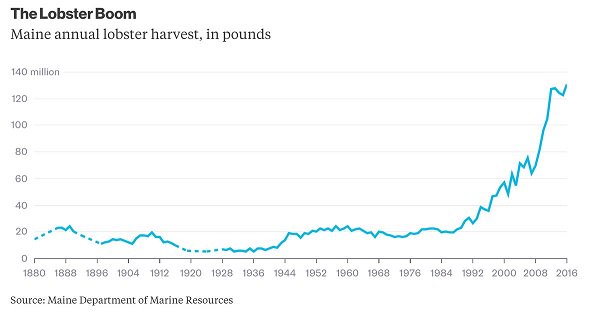Der Begriff ‚Anthropozän“ wurde von der stratigraphischen Kommission einhellig abgelehnt. Anhänger des Klimakatastrophismus benutzen den Term trotzdem gerne. Nnn meldete sich eine US-amerikanische Doktorandin, die mit dem Begriff „Anthropozän“ nicht zufrieden ist. Dieser würde suggerieren, dass ALLE Menschen Schuld an der Klimakatastrophe hätten. Dies wäre falsch, denn Frauen und Naturvölker hätten weniger Schuld. Der University of Pennsylvania war dies sogar eine eigene Pressemitteilung wert. WUWT titelte dazu passend:
UPenn: The word “Anthropocene” is a Dangerous Generalisation which Ignores White Male Colonial Capitalist Guilt for Global Warming
——————
Trotz oder wegen Klimawandel? Der Hummerfang in Neuengland zeigt einen typischen Hockeystick-Verlauf, wie James Taylor auf WUWT darstellte:

Aber wie passt das mit dieser Meldung des Deutschlandfunks von 2016 zusammen?
Klimawandel: Baby-Hummer sterben, wenn es zu warm ist
——————
Kommunikationsstrategien spielen in der Klimadebatte eine große Rolle. Hier ein interessanter Artikel aus der Stuttgarter Zeitung dazu (für Abonnenten):
Kommunikationswissenschaft: Die Macht der Begriffe
Wer sagt was auf welchem Weg zu wem mit welchem Effekt? Damit beschäftigt sich die Kommunikationswissenschaft seit Jahrzehnten. Warum sie die Leitwissenschaft unserer Zeit ist – und kaum einer es bemerkt hat.
——————
Im März 2019 berichteten wir: Fragwürdige Temperaturdaten stellen Ergebnisse einer Insektenalarmstudie in Frage. Die GWPF forderte am 4. Februar 2019 in einem Brief (pdf hier) die Zeitschrift PNAS auf, das Paper von Lister & Garcia 2018 zurückzuziehen. Dies geschah jedoch nicht. Jedoch erschien nun am 29. Mai 2019 ein ausgezeichneter Diskussionsbeitrag von Willig und Kollegen, der dem Alarm den Wind aus den Segeln nahm:
Populations are not declining and food webs are not collapsing at the Luquillo Experimental Forest
In PNAS, Lister and Garcia (1) report declines in abundances of understory arthropods and lizards between 1976 and 2012 and claim similar declines in populations of arthropods, frogs, and insectivorous birds based on data from the Luquillo Long-Term Ecological Research project (LUQ). Their conclusion, that increasing temperature has led to a collapse of the food web, has attracted considerable attention from public media, but this conclusion is not corroborated by empirical evidence from LUQ (see Supplementary Materials, https://luq.lter.network/pop-trends-yunque-luquillo). Also, the authors fail to consider the effects of hurricanes and subsequent changes during secondary succession.
[…]
Lister and Garcia (1) do not consider the effects of changing forest structure following Hurricane Hugo (1989), which inflated avian captures rates at the beginning of the sampling period (6, 7). Their conclusion that the abundance of the insectivorous Puerto Rican tody (Todus mexicanus) declined by 90% is not supported by mist-netting data (capture rates from 1980 are similar to those from 2005) or point-count data from the same period (figures 9–11 of Supplementary Materials).
We found no evidence to support the conjecture that food webs are collapsing at LUQ as a result of warming. The narrow focus on temperature-related aspects of climate change as the causative agent does not address the multiple disturbances (e.g., hurricanes and droughts) that affect the forest (8).
Ganzen Artikel auf PNAS lesen.